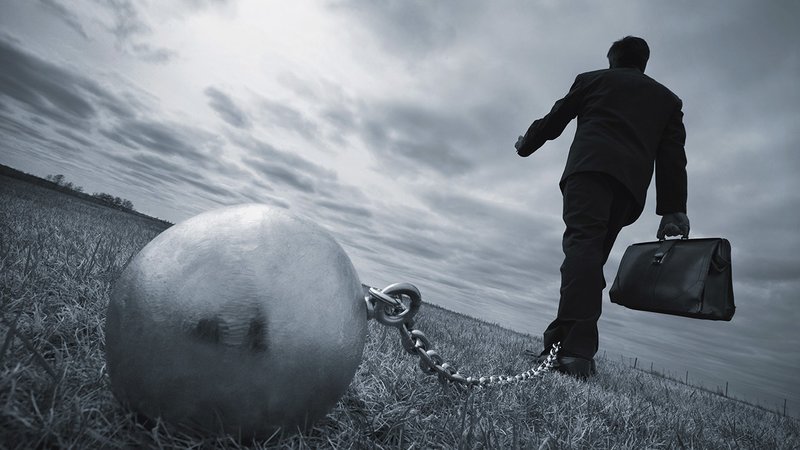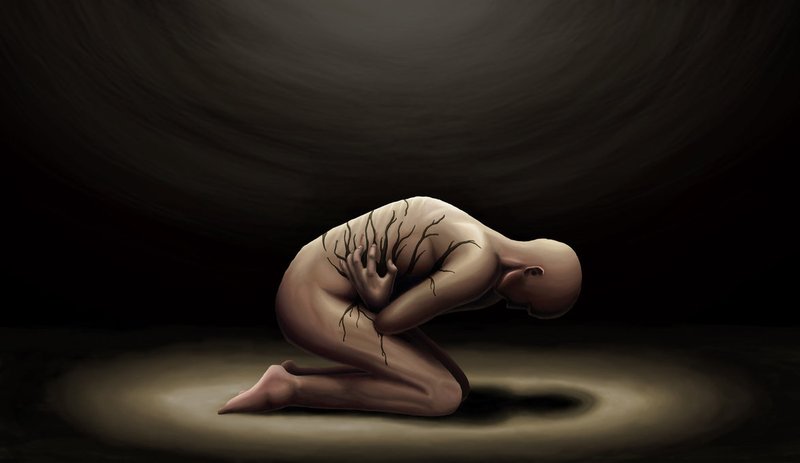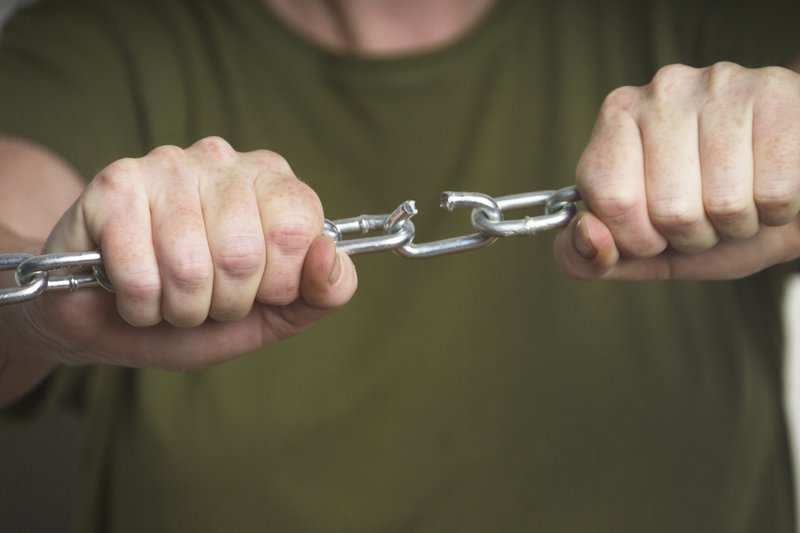
Almost every person faces a sense of guilt and shame for any misconduct in life. This is one of the most destructive emotions, which does not allow a normal life, causes excruciating feelings and mental suffering. The guilt that we could not repay in time in the shower, gradually eats up from the inside, negatively affecting self-esteem and relations with people. You need to know how to get rid of an unhealthy guilt and forgive yourself for a mistake made in the past.
How is an unhealthy guilt?

Feeling of guilt is not just remorse for a perfect misconduct that is normal for a normal person to experience. This is aggression, an internal reproach of oneself for a mistake, self-flagellation for action or inaction in a situation that can no longer be corrected.
In psychology, two types of guilt are distinguished: healthy and unhealthy. Healthy is due to reflection - a person’s tendency to analyze his experiences and actions, and correct them. Unhealthy, however, is not always associated with bad actions that you hurt another person.
Guilt is unhealthy when:
- You feel guilty every day;
- Feel guilty for another person (when someone was rude, did not pay the fare, or accidentally hurt you, but you consider yourself guilty, etc.);
- Often apologize;
- You are very worried and several times a day think about the words spoken by people;
- Reproach yourself for doing something for your own good or for your own free will;
- You are tormented when you didn’t do something for another person, although you didn’t have to.
An unhealthy guilt is often manifested when an individual could not achieve the expectations of another: first parents, then teachers, and then even the words of a complete stranger can have a significant impact. If you decide to take care of your needs and desires, for example, you bought your favorite food and didn’t share it, or found new clothes without buying anything for loved ones. For such self-indulgence, a person with an unhealthy guilt begins to torment, and purchases do not bring joy. A person feels that he did not have the right to such freedom and reproaches himself for it. Or, for example, when a couple in love lives together, but one of them did not wash the dishes of the other, and the partner began to be indignant about this. In this case, the person feels guilty for not taking due care.
Acute guilt manifests itself when a person acts contrary to his family. This is especially true for moments that are important in life: to move, change jobs, education, or even abandon it, start a family or not. Since parents are the first people who participate in the formation of our personality, they have a great influence. Unfortunately, many adults, when children grow up, do not fully realize that they are faced by an individual who is free to make decisions in his life. It depends on the desire to maintain control and personal complexes.However, when a person encounters resistance and disapproval from significant people, a strong, gnawing guilt arises. Although the guilt for making a decision in your life should not be absolutely.
The psychology of the problem lies in the behavior of the individual. A person with a guilt complex:
- He does not enter into disputes, discussions, avoids conflicts, cannot defend his position, fearing the reaction of others;
- Constantly analyzes what he told someone if he did the right thing;
- He tries to adapt to the expectations of another person, wants to be perfect and good;
- Afraid to offend others with words, utterances;
- Such an individual is easy to manipulate; he is often used for personal gain;
- It is difficult for him to refuse and say no.
A healthy guilt makes you analyze and correct mistakes. If you somehow violated another person, then ask for forgiveness, talk and you will not be tormented by this situation. A healthy sense of guilt teaches, while an unhealthy one brings only mental torment.
It is also important to be able to distinguish guilt from shamewhich many confuse. Shame is focused on the individual, on ourselves as a whole, and not on actions. When a person is ashamed, he feels that he did not make a mistake, but that he himself is a mistake, a miserable and worthless person. This feeling is much stronger and more harmful than guilt.
Causes of pathological guilt

There are emotions that are embedded in a person as early as two or three years of age, namely: pride, a sense of shame and guilt. At this age, awareness of personality and moral behavior begins to develop. Feelings of guilt, as such, are responsible for social norms, for the observance of morality and for responsibility for actions.
Therefore, like most problems associated with a person’s mental state, guilt is taken from early childhood and reinforced by the reaction of society in the future.
The reasons for the appearance and development of pathological feelings of guilt:
- A family. Many parents, not even knowing the elementary nuances of psychology, often make mistakes in education, especially for the first-born. As a result, inadvertently, the child is vaccinated with complexes, because of which he feels inferior. This list includes guilt. And it begins to arise, for example, when a person, as a child, walks in the yard and stains or tears his clothes. In this case, many parents begin to scold the child, publicly, pronouncing the following words: “How could you get dirty, you dishonor me!” Or, having heard the teenager’s music, they criticize: “What terrible music are you listening to! You have no musical taste! ”
- Perfectionism.When a person is encouraged only for good results, and scolded and ridiculed for failure, not allowing them to show weakness. Although we are all human beings and far from being perfect, many are not ready to forgive and accept commonality in anything. Each person has something better, but something not. Perfectionism is not necessary to achieve, and feel guilty because of its absence all the more.
- Hyperresponsibility.As a rule, this feeling is instilled when a person has younger brothers or sisters. However, often this responsibility flows to mature close relatives, including for the actions of uncles, aunts, etc. Although their behavior is not related to the individual at all. A person is responsible only for himself, but not for other people.
- Loss.And here we are talking not so much about the loss of an important person, but about the loss as such. Sometimes, something leaves our life, introducing changes of different significance into it. For example, you have lost a scarf, which means that it is time to get a new one, and you should not scold yourself for losing your favorite thing. Or, the situation is more serious, you have come under reduction at work, your fault is not in this. Instead of taking it for granted, some people begin to reproach themselves for not being able to do anything to prevent this.However, sometimes events happen in life that we cannot influence, and it is absolutely impossible to be attentive to everything.
Until the age of nine, the child believes that the world revolves around him and that everything he wants will be fulfilled. However, a turning point occurs when he begins to understand that not everything depends on him and no one owes him anything. This is a good stage of growing up, but some elements of such thinking sometimes remain in childhood, and then a person associates many events with himself.
Why is it hard to get rid of guilt?

Guilt, especially unhealthy, a rather pungent feeling that is not easy to get rid of. The reasons for this lie in our psyche, continuing to live and develop. The individual experiences a painful guilt based on his ideas about good and evil, morality and immorality. These aspects depend on embedded family and cultural values, which vary by country and tradition.
Guilt is not easy to get rid ofbecause it works protective mechanism who does not want to put you under more stress. You do not enter into discussions and disputes, rarely make important life decisions, justify your own inaction and fear of the unknown or what happened. You scold yourself and praise yourself for it: I don’t know how to do anything, I’m bad about it, I admit it, but I’m not going to change anything.
It is difficult to get rid of what has been vaccinated since childhood and created a comfort zone to which the individual is accustomed.
How to overcome guilt?

A person who feels obligated to everything cannot get rid of the “eternally guilty” complex. In adulthood, an individual tries to be good for everyone, is afraid to offend or disappoint others. If some life situation happens to him in which he had to act, in his opinion, wrongly or badly, he seeks out the reason only in himself and reproaches for the mistake.
To get rid of guilt and forgive yourself for mistakes, use psychologist's advice:
- A psychological technique called “Guilty Thoughts Counter”. You need to remember all your experiences and look them in the face. No wonder they say that recognizing a problem is the first step to solving it. So, take a piece of paper or a notepad, and imagine that you have a counter of guilt. Divide the sheet into three parts. First write down each case that made you feel guilty. In the second column, briefly describe each fault. And in the third, summarize whether this is a well-deserved guilt or undeserved feeling. It’s easy to answer, ask yourself two questions: “Did I harm someone?” And “Did I want to do bad things?” If the answers are negative, then the guilt is false and undeserved.
- The following exercise is similar to the first, choose which one you like best. Describe everything that causes internal anxiety and guilt on a piece of paper. State your act that torments you in all the smallest details. At the end, write down the reasons why you had to do just that. Find an excuse for your action and forgive yourself for it, then burn a sheet of paper. You should have the feeling that with the paper all the negative emotions that destroy life are burned out.
- Tell your painful experiences to someone who can understand you. It can be a psychologist, a specialist in a trust service or a close friend who can listen.
- If the fault is false, then try to forget the act that causes mental pain. Use one of the methods of psychology: if you have thoughts and memories of what you have done, say out loud a key phrase that you think up yourself, for example: “Life continues to go on, but the past remains in the past”, “Everything will be fine”, etc.
- A person will find a reason to remember the bad, but instead of constantly digging in your own flaws, direct your thoughts to find the good. For what you can praise yourself, even let it be trifles.For example, that they did not forget to water the plant, completed household chores, as you did / bought and gave a gift to an important person. To enhance the effect, write them down and re-read them sometimes.
- Do not compare yourself to anyone other than yourself. You are a separate person, an individual. The only person to whom you must prove that you can be better is yourself.
- Stop interfering and try to “save” someone else's life. You don’t need to be an insensitive egoist, but it’s important to understand when a person really needs your help, whether you can provide it correctly and whether the individual is a “drowned man” who, after the assistance, brazenly sits on your neck.
- Learn to express openly what you like and what not. This is your opinion, your position and you have the right not to be silent. An unhealthy guilt is something that you could not tell anyone. And speaking out is very important.
- Treat mistakes as life lessons and nothing more. Analyze, draw a conclusion and live on.
Many events in life occur because of circumstances, and not because of the actions and reactions of the person himself. Not everything is subject to our control and there is no need to feel guilty for this.
A frequent occurrence, when a person experiences guilt before the dead, he regrets what was said and untold. However difficult it may be, it is also a false guilt. In this case, you can calm your emotions and forgive yourself through atonement. Do good to a stranger, pay attention to those who are dear to you. You will not do anything to the deceased, he does not need your actions and words, but much can be corrected with those who are alive.
Feeling guilty is something that a person is vaccinated for many years, starting from childhood. A person by nature perceives and remembers negative more, since he evokes strong and vivid emotions. You can get rid of tearing feelings with the help of reverse suggestion, aimed only at the good and the positive.
Conclusion

Psychologists consider guilt feelings to be complex, socially-formed emotions. It can be used for good, raising a decent person, but can be used negatively, manipulating the values of the individual, suppressing him as a person.
As a child, you are not responsible for yourself, but, having matured, are able to change a lot if you even understand approximately how your consciousness works. Be honest and honest with yourself. Stop pleasing everyone; it is impossible to become good for everyone. Learn to say no, respect the choice and value the time, both your own and that of others.
Remember that you are a separate person who has his own interests, who is capable of what the other is not capable of. Directing energy to self-development, you will become better in your own eyes. And the more confident you are in your abilities, the more impossible control over you will become. In any situation, remain yourself, do not try to meet someone's expectations. A man was born to be happy, do not let others take it from you.



































Original.
Question: “How to forgive yourself”
Answer: “You must forgive yourself!”
Good science psychology !!!!!!!!!!!!!!!!!!!!!!!!